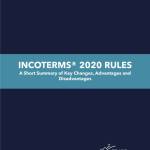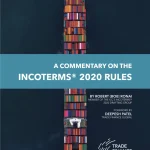Bob Ronai
Bob has over 50 years of experience in the exporting and importing sector, beginning his career in international banking and later moving into international trade.
Quick Guide to Incoterms
Download our complimentary short guide

Download now
Comprehensive Incoterms Guide
Purchase our 96-page detailed guide

Buy now
Cost, Insurance and Freight (CIF) – Incoterms® 2020 Rules [UPDATED 2024]
The Cost, Insurance and Freight (CIF) Incoterm is essentially similar to the CFR Incoterm, with one key difference: the inclusion of insurance. In the CIF agreement, although the risk transfers to the seller once the goods are loaded onto the vessel, the seller is required to secure insurance coverage for the buyer’s risk.
Introduction to Cost, Insurance and Freight (CIF)
Under the CIF term, the seller is obligated to package the goods for shipment, handle export clearance, arrange transport to the designated port of destination, and load the goods on the vessel. The shipping documentation typically notes that “freight is prepaid.”
Conversely, the buyer takes on the responsibility for unloading the goods at the destination port, along with any duties, taxes, and other import customs costs. The seller is mandated to procure cargo insurance, which must at least provide minimum coverage through the Institute Cargo Clauses (C) or similar standards.
This minimal insurance must cover the goods from delivery until they reach the specified port of destination, amounting to at least 110% of the contract price. The seller must also provide the buyer with the insurance policy or an appropriate certificate, which must be endorsed to allow for claims by the buyer if necessary.
Cost, Insurance and Freight (CIF) Incoterms 2020 Rule – Key Changes
The CIF term has origins dating back to the early days of international shipping and has largely remained stable. The distinction between CIF and CFR is that while the responsibility for loss or damage transfers to the buyer, the seller must provide insurance for that risk, offering documents that allow the buyer to assert claims against that insurance.
Cost, Insurance and Freight (CIF) Podcast
CIF: Advantages and Disadvantages
CIF provides both benefits and drawbacks for the seller and buyer in a shipping agreement. For sellers, it allows for potential additional profits by arranging insurance at a lower cost and charging buyers a markup on that insurance. For buyers, CIF simplifies processes, as the seller undertakes the insurance, reducing their administrative work.
However, buyers may face challenges when claiming insurance, as sellers might prioritize cost savings over effective coverage. This can complicate claims processes, potentially leading to financial losses. Additionally, some jurisdictions do not allow CIF imports, requiring buyers to obtain their own insurance.


